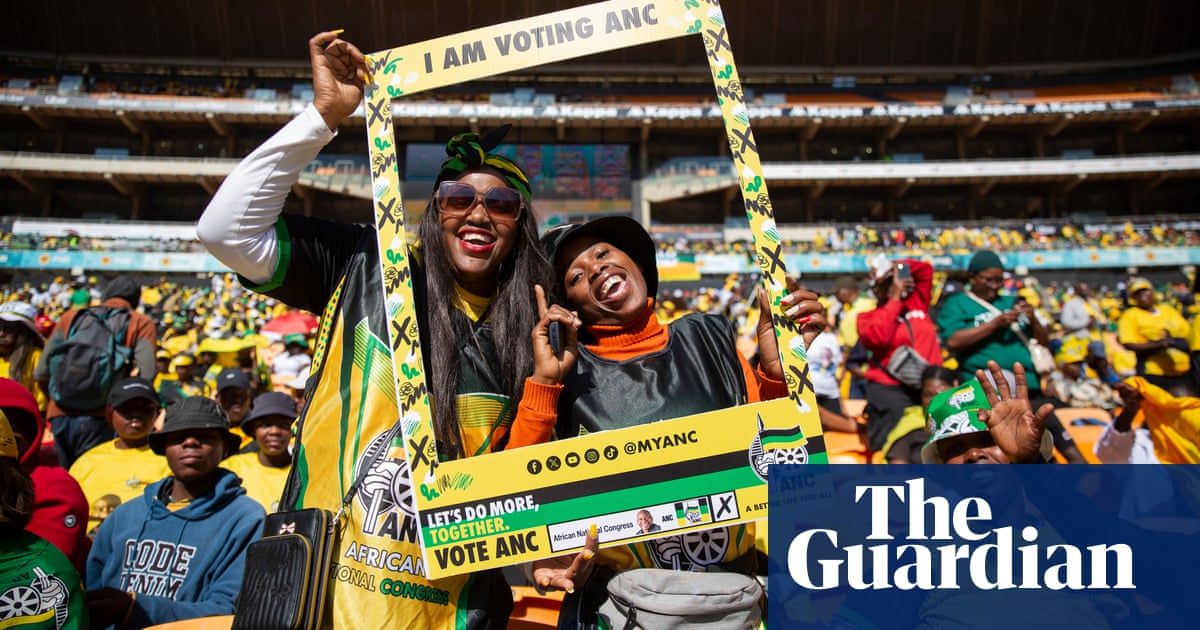
Future historians might look back on May 2024 as a pivotal moment in South Africa’s post-apartheid history, with potentially major implications not only domestically but internationally as well.
The reason for this tipping point is that the elections on May 29 indicated that the era of political dominance by the African National Congress might be over. In the six prior national ballots since 1994, the ANC won significantly more than 50 percent of the vote but that changed this week, likely heralding a new era of co-governance and, with it, new uncertainties.
There is even a growing possibility that as soon as 2029, South Africa could deliver the first non-ANC government in the nation’s post-apartheid history.
The ANC remains the largest party for now, well ahead of a growing number of opposition movements; more than 50 parties registered for the 2024 election, a record number, and independent candidates allowed to stand for the first time.
There is a possibility the ANC could form a minority government but that would constrain its ability to adopt policies and introduce legislation. So it will probably have to strike agreements or form a coalition with other parties to remain in government under President Cyril Ramaphosa — or possibly his successor, such as his deputy Paul Mashatile — if he decides to step down or if there is a leadership challenge.
When the final election results are confirmed, the ANC will have 14 days to form a government before a new parliament must convene to elect a president. The speed with which a coalition can be formed, or not, might well prove to be a leading indicator of how much political gridlock to expect in the next few years.
While much of the focus is on the domestic implications of the significant political change the 2024 election delivered, the international ramifications could also be key. In the past decade or two, South Africa’s economy — the largest on the continent, with a gross domestic product of about $370 billion — has badly underperformed. Its GDP is only about one-fiftieth that of China, despite both nations being members of the BRICS group of emerging markets alongside founder members India, Russia and Brazil.
What this highlights is the significantly diverging economic trajectories of these key emerging markets in recent years. Among the original BRICS members, China and India have enjoyed generally robust economic performance over the past two decades, in contrast with disappointing results not only in South Africa but also in Brazil and Russia.
So a key question, not only domestically but internationally, is whether South Africa can turn this economic situation around. According to the World Bank, the nation’s economy has retrogressed over the past decade and a half, with per capita GDP falling from a high point in 2011. This has led to a significant drop in living standards, with its people more than 20 percent less well-off on average.
There is a growing possibility that as soon as 2029, South Africa could deliver the first non-ANC government in the nation’s post-apartheid history.
Andrew Hammond
It is estimated that about a third of the labor force is unemployed, the highest rate in any country monitored by the World Bank. Income inequality is exceptionally high, with more than twice as many people (over 18 million) on welfare benefits compared with the number of taxpayers (about 7 million).
One consequence of this economic malaise is that a significant proportion of South African-listed firms are currently valued at a discount relative to those in other key emerging markets. This creates a potential opportunity for investors, albeit one with political risk.
The key variable that will affect the economy most, in the next few years at least, is perhaps the nature of the co-governance the ANC opts for. Prior to the election, there were hopes within the business community that the party would win close to 50 percent of the vote and so be able to co-govern with one or more of the smaller parties, such as the Inkatha Freedom Party, the Patriotic Alliance and/or the Muslim party Al-Jama-ah.
However, the ANC has underperformed even in terms of these reduced expectations, raising the possibility it might need to do a deal with a larger party. One option in this case is the business-friendly Democratic Alliance, which took second place in the ballot.
However, investors are concerned that a window of opportunity might now open up for the ANC to govern with the leftist Economic Freedom Fighters, led by the radical Julius Malema, and/or former President Jacob Zuma’s uMkhonto weSizwe Party. These parties have plans to potentially expropriate land without compensation, and nationalize the nation’s central bank. Many investors are therefore worried that an ANC collaboration with one or both of them could result in the reversal of some early signs that Ramaphosa’s economic reforms might slowly, but surely, be working.
There is also broader uncertainty over the implications of the growing fragmentation of the nation’s polity. The country increasingly seems split along identity lines; the ANC, once depicted as unifying a “rainbow nation” now increasingly draws its support from the 80 percent black majority population.
For now, no major political group seems able to reflect the multiracial reality of a country that also has a significant number of people who are white, of Indian heritage or who are of biracial ethnicity.
The election has, therefore, created significant political and economic uncertainty, and there are several possible trajectories the nation could take in the second half of this decade. The key variable now is which, if any, political partners the ANC will choose to help it govern Africa’s largest economy.
Andrew Hammond is an Associate at LSE IDEAS at the London School of Economics.











